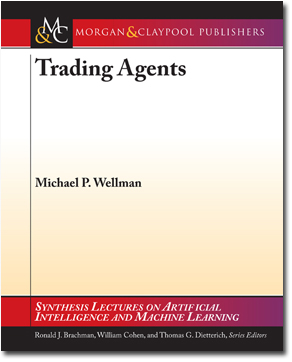Michael Wellman Authors Book on Trading Agents for Electronic Markets

 Enlarge
Enlarge
Professor Michael P. Wellman has authored a new book entitled “Trading Agents,” which has been published by Morgan & Claypool as a part of their Synthesis Lectures on Artificial Intelligence and Machine Learning series.
The book is written as a guide to the design and analysis of trading agents for electronic markets. By presenting key principles drawn from research in economics and artificial intelligence, it aims to equip the designer with some basic tools for strategic reasoning about market interactions.
Automated trading in electronic markets is one of the most common and consequential applications of autonomous software agents. Design of effective trading strategies requires thorough understanding of how market mechanisms operate, and appreciation of strategic issues that commonly manifest in trading scenarios. Drawing on research in auction theory and artificial intelligence, this book presents core principles of strategic reasoning that apply to market situations. It illustrates trading strategy choices through examples of concrete market environments, such as eBay, as well as abstract market models defined by configurations of auctions and traders. Techniques for addressing these choices constitute essential building blocks for the design of trading strategies for rich market applications. The book assumes no prior background in game theory or auction theory, or artificial Intelligence.
Prof. Wellman is a member of the Artificial Intelligence Laboratory in the Department. For the past 19+ years, his research has focused on computational market mechanisms for distributed decision making and electronic commerce. As Chief Market Technologist for TradingDynamics, Inc. (now part of Ariba), he designed configurable auction technology for dynamic business-to-business commerce. Wellman previously served as Chair of the ACM Special Interest Group on Electronic Commerce (SIGecom), and as Executive Editor of the Journal of Artificial Intelligence Research. He is a Fellow of the Association for the Advancement of Artificial Intelligence and the Association for Computing Machinery.
 MENU
MENU 
